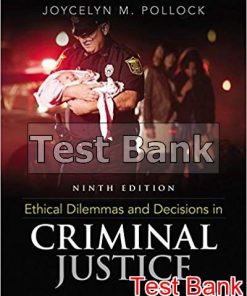Ethical Theory and Business 9th Edition Arnold Test Bank
You may also like
Instant download Ethical Theory and Business 9th Edition Arnold Test Bank pdf docx epub after payment.

Product details:
- ISBN-10 : 0205169082
- ISBN-13 : 978-0205169085
- Author:
anthology of readings, legal perspectives, and cases in business ethics.
Ethical Theory and Business provides students with a strong understanding of ethics in business. Case studies, a discussion of ethical theory, and a diverse range of perspectives on specific topics give students the tools needed to address ethical situations in business and challenge them to think for themselves.
Learning Goals
Upon completing this book readers will be able to:
- Reflect on ethical and sustainable business practices
- Understand the role of ethics in all function areas of business including management, marketing, international business, human resources, finance, and accounting
- Discuss the most pressing issues confronting business leaders today
Table of contents:
Part I: ETHICAL THEORY.
1. Ethics and Ethical Reasoning.
Why Study Ethics? What is Ethics? Ethical and Other Types of Evaluation. Sociobiology and the Naturalistic Fallacy. Ethical Terms. Ethics and Reasons. Intuitionism, Emotivism, Subjectivism, Objectivism. Ethical Reasoning and Arguments. The Structure of Ethical Reasoning and Argument. Evaluating and Making Good Arguments. Ethical Theory. Types of Ethical Theory. Can Ethics Be Taught. Readings: David Hume, Ethical Judgments and Matters of Fact (from Treatise); C.L. Stevenson, Emotivism and Ethics. Review Exercises.
2. Religion and Global Ethics.
Freedom, Cosmopolitanism, and the European Enlightenment. Religion, Civic Life, and Civil Disobedience. Ethics, Religion, and Divine Command Theory. Pluralism and the Golden Rule. The Problem of Evil and Free Will. Secular Ethics and Toleration. Criticisms of Secularism and Global Ethics. Readings: Plato, Euthyphro; M.K. Gandhi, Religion and Truth. Review Exercises.
3. Ethical Relativism.
Descriptive vs. Normative Ethical Relativism. Individual vs. Cultural Relativism. Strong and Weak Relativism. Reasons Supporting Ethical Relativism. The Diversity of Moral Views. Tolerance and Open-Mindedness. Moral Uncertainty. Situational Differences. Are these Reasons Convincing? Situational Differences. Is Relativism Self-Contradictory? Moral Realism. Moral Pluralism. Readings: Louis Pojman, Who’s to Judge? John Lachs, Relativism and Its Benefits. Review Exercises.
4. Egoism, Altruism, and the Social Contract.
Psychological Egoism. What Is Psychological Egoism? Is Psychological Egoism True? Ethical Egoism. What Is Ethical Egoism? The Moral Point of View. Why be Moral? Readings: Plato, The Ring of Gyges (from Republic); Thomas Hobbes, Self Love (from Leviathan); Steven Pinker, the Social Contract and Altruism (from The Blank Slate). Review Exercises.
5. Utilitarianism and John Stuart Mill.
Weighing Consequences. Historical Background. Jeremy Bentham and John Stuart Mill. The Principle of Utility. Pleasure and Happiness. Calculating the Greatest Amount of Happiness. Quantity vs. Quality of Pleasure. Evaluating Utilitarianism. Application of the Principle. Utilitarianism and Personal Integrity. Ends and Means. The Trolley Problem. Act and Rule Utilitarianism. “Proof” of the Theory. Reading: John Stuart Mill, Utilitarianism. Review Exercises.
6. Deontological Ethics and Immanuel Kant.
Deontology and the Ethics of Duty. Immanuel Kant. What Is the Right Motive? What Is the Right Thing to Do? The Categorical Imperative. The First Form. The Second Form. Evaluating Kant’s Moral Theory. The Nature of Moral Obligation. The Application of the Categorical Imperative. Duty. Perfect and Imperfect Duties. Variations on Kant and Deontology. Reading: Immanuel Kant, Fundamental Principles of the Metaphysic of Morals. Review Exercises.
7. Natural Law and Human Rights.
Natural Law Theory. Historical Origins. Evaluating Natural Law Theory. Natural Rights. Evaluating Natural Rights Theory. Is There a Human Nature? Readings. Thomas Aquinas, On Natural Law. John Locke, Second Treatise of Civil Government. Review Exercises.
8. Virtue Ethics.
Virtues and Everyday Life. Aristotle. Virtue as a Mean. Nature, Human Nature, and the Human Good. Cross-Cultural and Contemporary Virtue Ethics. Evaluating Virtue Ethics. Readings: Aristotle, Nicomachean Ethics. Review Exercises.
9. Feminist Thought and the Ethics of Care.
Gender in Moral Reasoning and the Ethics of Care. Is There a Gender Difference in Morality? The Source of Feminine Morality. Evaluating Gender-Specific Approaches to Morality. Feminist Thought. Evaluation of Feminist Thought and the Ethics of Care. Readings: Nel Noddings, Caring; Annette Baier, The Need for More than Justice; Hilde Lindemann, What is Feminist Ethics? Review Exercises.
Part II: ETHICAL ISSUES.
10. Euthanasia.
Euthanasia for Infants and the Disabled. Criteria for Death. Types of Euthanasia. Active and Passive Euthanasia. Voluntary, Nonvoluntary, and Involuntary Euthanasia. Physician-Assisted Suicide. Pain Medication and Palliative Sedation. Ordinary and Extraordinary Measures. Combining the Types of Euthanasia. Making Moral Judgments About Euthanasia. The Moral Significance of Voluntariness. Active versus Passive Euthanasia. Readings: J. Gay-Williams, The Wrongfulness of Euthanasia; James Rachels, Active and Passive Euthanasia. Review Exercises. Discussion Cases.
11. Abortion.
Stages of Fetal Development. Methods of Abortion. Abortion and the Law. Abortion: The Moral Question. Arguments that Do Not Depend on the Moral Status of the Fetus. Arguments that Depend on the Moral Status of the Fetus. Utilitarian Reasoning. Some Rights Arguments. Arguments That Depend on the Moral Status of the Fetus. Method I. Method II. Readings: Judith Jarvis Thomson, A Defense of Abortion; Don Marquis, Why Abortion is Immoral; Bertha Alvarez Manninen, The Value of Choice. Review Exercises. Discussion Cases.
12. Sexual Morality.
Current Issues. Conceptual Problems: What Is and Is Not Sexual. Relevant Factual Matters. Sexual Morality and Ethical Theories. Consequentialist or Utilitarian Considerations. Non-consequentialist or Deontological Considerations. Natural Law Considerations. Gay Marriage. Readings: U.S. Supreme Court Decision, Obergefell v. Hodges; John Finnis, Law, Morality, and “Sexual Orientation”; John Corvino, It’s Not Natural. Review Exercises. Discussion Cases.
13. Equality and Discrimination.
Discrimination. Racial Discrimination. The Principle of Equality. Justice. Social Benefits and Harms. Proof and Reality of Difference. Relevant Differences. Challenges to the Principle. Current Issues and the Law. Profiling. Hate Crimes. Affirmative Action and Preferential Treatment. Consequentialist Considerations. Non-consequentialist Considerations. Readings: Iris Marion Young, Five Faces of Oppression; Kwame Anthony Appiah, Racisms; Naomi Zack, White Privilege, Black Rights. Review Exercises. Discussion Cases.
14. Economic Justice.
Economic Inequality. Poverty, Education, and Health Care. Conceptions of Social Justice. Process Distributive Justice. End-State Distributive Justice. Equal Opportunity. Political and Economic Theories. Libertarianism. Capitalism. Socialism. Modern Liberalism. John Rawls’s Theory of Justice. Communitarianism. Readings: John Rawls, Justice as Fairness; Robert Nozick, Distributive Justice. Review Exercises. Discussion Cases.
15. Punishment and the Death Penalty.
The Nature of Legal Punishment. The Deterrence Argument. The Retributivist Argument. Punishment and Responsibility. Prisons. Race. Restoration and Rehabilitation. The Death Penalty. Legal Issues. Exonerations. Racial Bias and Fairness. Costs. Deterrence Considerations. On Retributivist Grounds. Mercy and Restorative Justice. Humane Executions. Readings: Michelle Alexander, The New Jim Crow; Angela Y. Davis, Are Prisons Obsolete?; John Stuart Mill, Speech in Favor of Capital Punishment; Lloyd Steffen, A Theory of Just Execution. Review Exercises. Discussion Cases.
16. Environmental Ethics.
The Environment and Its Value. Anthropocentrism. Cost–Benefit Analysis. Environmental Justice. Ecocentrism. Deep Ecology. Ecofeminism. Current Issues. Climate Change. Ozone Depletion. Waste Disposal and Pollution. Wilderness Preservation. International Environmental Conventions. Global Justice and the Tragedy of the Commons. Readings: William F. Baxter, People or Penguins: The Case for Optimal Pollution; Bill Devall and George Sessions, Deep Ecology; Ramachandra Guha, Radical American Environmentalism and Wilderness Preservation: A Third World Critique. Review Exercises. Discussion Cases.
17. Animal Ethics.
Current Issues. Moral Vegetarianism. Animal Experimentation. Endangered Species. Approaches to Animal Ethics. Sentience, Equal Consideration, and Animal Welfare. Animal Rights. Readings: Peter Singer, All Animals Are Equal; Tom Regan, The Case for Animal Rights; Bonnie Steinbock, Speciesism and the Idea of Equality. Review Exercises. Discussion Cases.
18. Biotechnology and Bioengineering.
Current Issues. Athletic and Cognitive Enhancement. Stem Cell Research. Cloning. Genetic Engineering and Genetic Screening. Genetically Modified Plants and Animals. Legal and Ethical Issues. Athletic and Cognitive Enhancement. Stem Cell Research. Cloning. Genetic Engineering and Genetic Screening. Genetically Modified Organisms. Readings: Various Authors, Transhumanist Declaration; Leon R. Kass, Ageless Bodies, Happy Souls; Nick Bostrom, In Defense of Posthuman Dignity. Review Exercises. Discussion Cases.
19. Violence and War.
Realism. Pacifism. Just War Theory. Jus ad Bellum. Jus in Bello. Current Issues. Terrorism. Targeted Killing and Drones. Weapons of Mass Destruction. War Crimes and Universal Human Rights. Torture. Readings: Andrew Fitz-Gibbon, Peace; Michael Walzer, The Triumph of Just War Theory (and the Dangers of Success). Review Exercises. Discussion Cases.
20. Global Justice and Globalization.
Moral Arguments about Global Poverty. Self-Interest. Justice. Rights. Practical Considerations. Global Inequality. Levels of International Aid. Causes of Global Poverty. Solutions and Progress. Globalization and Its Critics. Economic Impacts. Cultural Diversity. Readings: Peter Singer, The Singer Solution to World Poverty; Garrett Hardin, Living on a Lifeboat; Vandana Shiva, Principles of Earth Democracy. Review Exercises. Discussion Cases.
People also search:
solutions ethical theory and business
beauchamp and bowie ethical theory and business
ethical theory and its application to business
business ethics theories and approaches
what are the theories of business ethics
business ethics explained
what is business and ethics
business ethics theories and concepts












